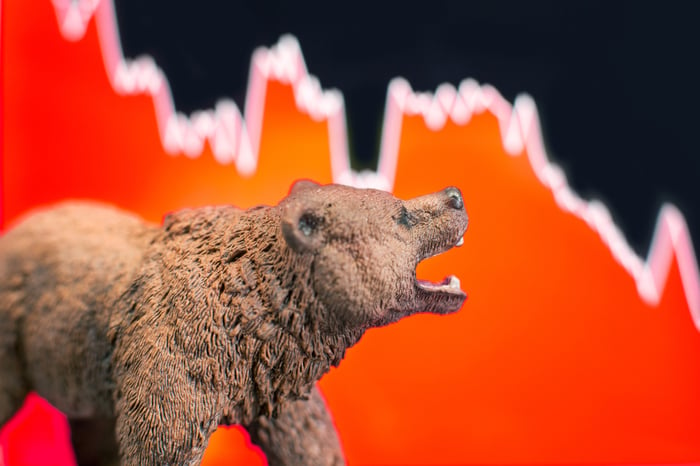The trailing two years have certainly tested the resolve of investors. Over that span, we've watched the major indexes surge to record-closing highs, plunge into a bear market, and now strongly rebound during the first half of 2023.
The Nasdaq Composite (^IXIC 2.02%) has been taken on the wildest ride of all, with the innovation-fueled index shedding 33% of its value in 2022 and rising 32% through the first six months of the current year.

Image source: Getty Images.
Despite this significant bounce, the Nasdaq remains 14% below its all-time closing high, set in November 2021. In other words, it signals that bargains can still be found -- especially among beaten-down growth stocks.
What follows are four unequaled growth stocks you'll regret not buying in the wake of the Nasdaq bear market dip.
Mastercard
The first exceptional stock that investors can confidently add to their portfolios following a sizable swoon in the Nasdaq is payment processor Mastercard (MA 0.07%). Although concerns about a possible U.S. recession in the months to come have, at times, weighed on shares of cyclical financial stocks like Mastercard, the company's well-defined competitive advantages make it easy for patient investors to overlook these short-term worries.
To start with the obvious, Mastercard has time on its side. Even though recessions are a normal part of the economic cycle, they don't last long. Not only do economic expansions last considerably longer than recessions, but the typical bull market has lasted about 3.5 times longer than the average bear market since 1929. The point is that Mastercard spends more of its time benefiting from an expansionary environment than playing defense in an uncertain one.
Mastercard is also a key domestic- and global-payments facilitator. It's the No. 2 payment processor by credit card network-purchase volume in the U.S. and the largest global market for consumption, and it has a lengthy runway for international expansion. Most emerging markets remain underbanked, which provides Mastercard with a multidecade opportunity to introduce its payment infrastructure to merchants.
But the most attractive aspect of Mastercard's business might be its avoidance of lending. By solely focusing on payment facilitation, Mastercard's management team has ensured the company won't be impacted by loan losses and credit delinquencies. This helps the company quickly rebound from economic downturns.
Although Mastercard isn't "cheap" in the traditional sense of the word, its forward price-to-earnings (P/E) ratio of 27 is the lowest it's been since 2018. Considering the company's sustained double-digit growth rate, it looks like a stellar company to own.
Fiverr International
A second unequaled growth stock you'll regret not adding following the Nasdaq bear market decline is gig economy up-and-comer Fiverr International (FVRR 3.74%). In spite of overblown worries about artificial intelligence (AI) eating into Fiverr's long-term usefulness, the company looks to have three sustained catalysts working in its favor.
The first lift for Fiverr comes from a permanent shift in the labor force following the COVID-19 pandemic. Although some workers have returned to a traditional office setting, more people than ever are working remotely. Since Fiverr provides an online marketplace that connects freelance workers with businesses, a higher percentage of remote workers is precisely what investors would want to see.
The next catalyst can be seen in the way freelancers present their skill sets on Fiverr's platform. Whereas freelancers on other sites list their jobs at an hourly rate, Fiverr freelancers price their tasks as a complete package. The advantage of this, from a buyer's standpoint, is unparalleled price transparency. Not surprisingly, the total number of buyers on Fiverr's platform, as well as spend per buyer, has been steadily climbing for years.
However, the most important catalyst for Fiverr looks to be its take-rate, which is the percentage of each deal negotiated on its freelancer marketplace that it keeps. While most of its peers are collecting a take-rate in the mid-teens, Fiverr's hit 30.4% in the March-ended quarter. Fiverr is keeping far more than its peers, yet it's not driving away freelancers or buyers.
A forward-year earnings multiple of 14 is a downright bargain for shares of Fiverr.

Image source: Getty Images.
Jazz Pharmaceuticals
The third unparalleled growth stock you'll regret not scooping up with the Nasdaq well below its all-time high is biotech company Jazz Pharmaceuticals (JAZZ 1.89%). While there is some concern about Avadel Pharmaceuticals bringing narcolepsy drug Lumryz to market -- Lumryz is an extended-release reformulation of Jazz's narcolepsy drug Xyrem -- Jazz looks to have plenty in its product portfolio and pipeline to support a considerably higher valuation.
To start with, Jazz is well prepared to deal with Xyrem competitors. That's because it developed a next-generation version of Xyrem known as Xywav, which was first approved by the U.S. Food and Drug Administration in July 2020. Xywav contains 92% less sodium than Xyrem, making it ideal for persons with heart conditions. In other words, Jazz should have little trouble converting Xyrem users to Xywav over time, thus preserving its cash flow.
Another reason to trust in Jazz Pharmaceuticals is the company's area of focus: orphan drugs. By targeting diseases that affect 200,000 or fewer people, Jazz is ensuring that it faces little or no competition in the indications it serves. It also means minimal push back on brand-name drug list prices with insurers. Jazz has consistently demonstrated some of the strongest pricing power among drug developers.
Additionally, Jazz's pipeline is promising. The company expects three phase 3 trial readouts before the end of 2024, including JZP150 for post-traumatic stress disorder, JZP385 (better known as suvecaltamide) for the treatment of essential tremor, and zanidatamab, which is being examined in gastroesophageal and esophageal adenocarcinomas. Jazz's oncology segment is closing in on $1 billion in annual sales, and its needle is most definitely pointing higher.
With Wall Street expecting Jazz to grow its profits by an annualized average of 12% over the next five years, its forward P/E ratio of 6.5 is an absolute steal.
PayPal Holdings
A fourth unequaled growth stock that you'll regret not buying in the wake of the Nasdaq bear market dip is fintech leader PayPal Holdings (PYPL 2.90%). Although above-average inflation threatens to reduce the purchasing power of low earners, there are plenty of reasons to overlook this very short-term headwind and focus on the long-term potential of digital payments.
For example, even though U.S. gross domestic product (GDP) retraced during the first-half of 2022, the total payment volume (TPV) traversing PayPal's digital networks has sustained a growth rate in the low double digits, excluding currency movements. If PayPal can maintain low double-digit TPV growth during a period of heightened economic uncertainty, just imagine what it's going to do during the next multiyear period of expansion.
The key to PayPal's success is the company's active user engagement. Between Dec. 31, 2020 and March 31, 2023, the average number of transactions completed over the trailing 12 months by active accounts grew from 40.9 to 53.1. Since PayPal's platform is primarily driven by fees, a more active user equates to higher gross profit.
We're also seeing discernable efforts by management to reward its long-term shareholders. Recognizing that short-term growth has tapered off, PayPal's board OK'd up to $15 billion worth of share buybacks last year. Furthermore, the company anticipates reducing its full-year operating expenses in 2023 by at least $1.3 billion. This combination of buybacks and cost-cutting should provide a boost to the company's earnings per share.
Over the past five years, PayPal has traded at an average multiple of 38 times year-end cash flow and nearly 35 times forward-year earnings. Investors can pick up shares right now for just 9 times consensus cash-flow estimates for 2024 and a forward P/E ratio of just 12. PayPal has simply never been this cheap.





